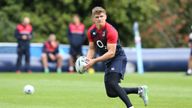England v Australia: Five talking points ahead of do-or-die game
Last Updated: 03/10/15 9:10pm
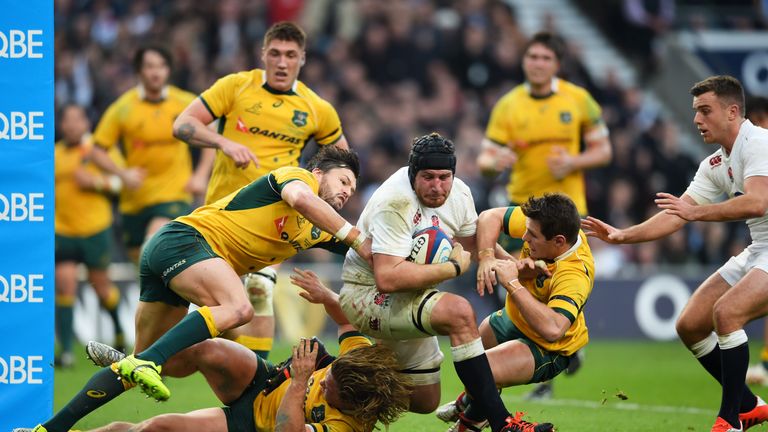
We look at five key talking points ahead of England's must-win Pool A game against Michael Cheika's Wallabies...
Sticking to strengths
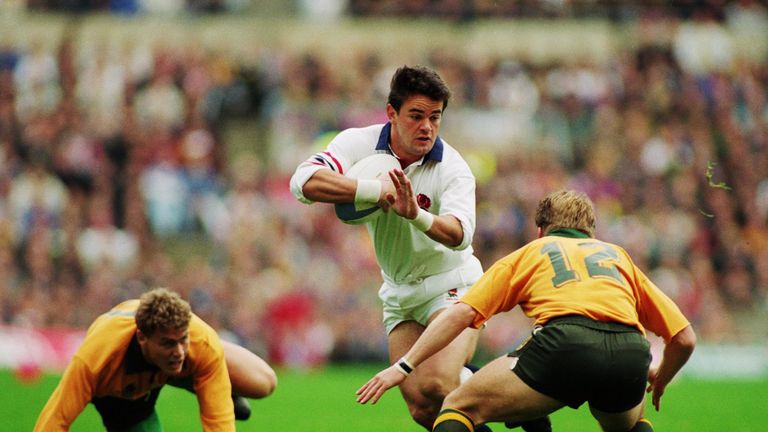
In 1991 England famously deviated from a successful style that took them to the final of the World Cup at Twickenham.
Despite dominating teams with hard-hitting forwards and a tactical kicking game throughout the competition, England had been crushed 40-15 in Sydney four months earlier, and therefore decided to play an expansive game in the final. It backfired and they fell to a disappointing 12-6 defeat.
Captain on the day was Will Carling, and when Carling spoke to Sky Sports ahead of the World Cup, he warned his countrymen against falling into the same trap of playing away from their strengths.
"The danger for England is that they don't get caught, or stuck, between two stalls," said Carling. "It's got to be one or the other.
"As usual with England they've got a great front five - in fact they've probably got two great front fives if we're honest - who will be as good if not slightly better than anything else in the competition.
"So there's the big conundrum. Do they need a little more variety in their game in order to win, or could they rely purely on a Farrell plus a forward pack? That's the big question."
With the backline Lancaster has picked, there is variation in the capabilities of Jonathan Joseph, but the selection of Owen Farrell and Brad Barritt calls for a pragmatic game; one which England will have to employ if they are to beat the Wallabies.
Despite the fact that England have an electric back three, Farrell will likely opt to play for territory to keep Australia at bay.
Playing fetch
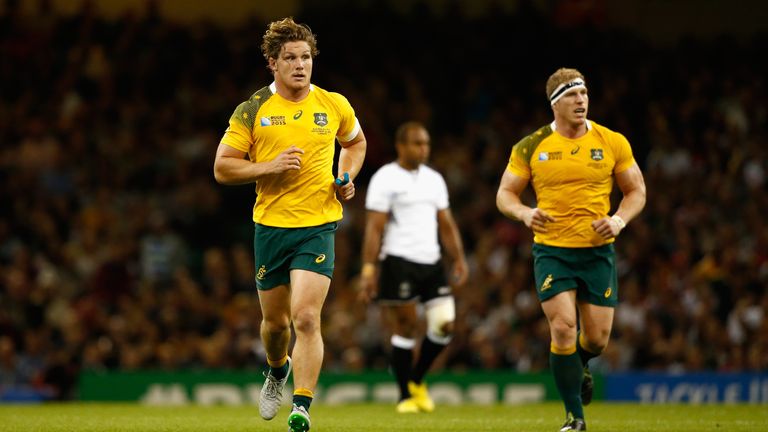
For months Lancaster has endured questions over the selection of Chris Robshaw at openside. As captain of the team, Lancaster defended the selection of the Harlequins flanker, but his selection comes with reduced impact at the breakdown.
Robshaw is more of a blindside than openside, and has been exposed at the ruck by specialist fetchers.
It's no secret that England will be targeted in that area by the Wallabies, who have selected two specialist fetchers in David Pocock and Michael Hooper, but former Australia coach Eddie Jones was particularly scathing in his analysis of Robshaw's contribution in the No 7 jersey.
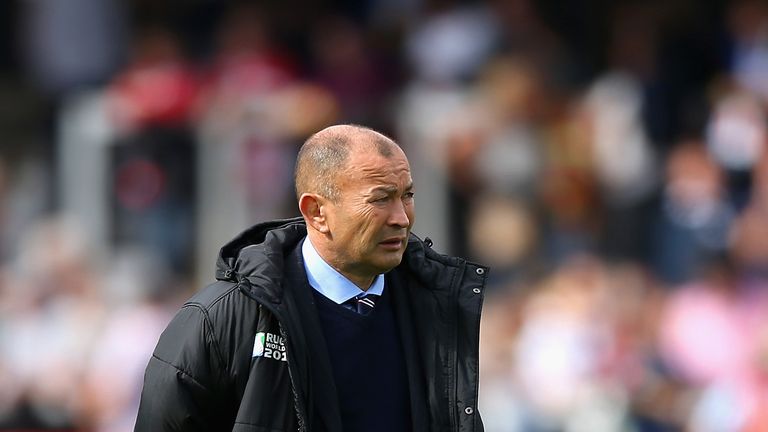
To me, Robshaw is an outstanding club player, but at international level he just doesn't have that point of difference.
Eddie Jones
"The breakdown will be a key area of the game on Saturday and Australia can dominate there because England simply don't have the specialist skills to compete with them," Jones wrote in the Daily Mail.
"David Pocock is an out-and-out 'fetcher'. At the moment, there is no one in the world better than him over the ball. Stuart Lancaster doesn't have that sort of fetcher in his team.
"To me, Robshaw is an outstanding club player, but at international level he just doesn't have that point of difference," he added.
"He carries okay, he tackles okay, but he's not outstandingly good in any area. I think that is his limiting factor. He's a good workmanlike player, but he does not have the specialist skills and the instinct as an openside that Pocock has."
Set piece debate
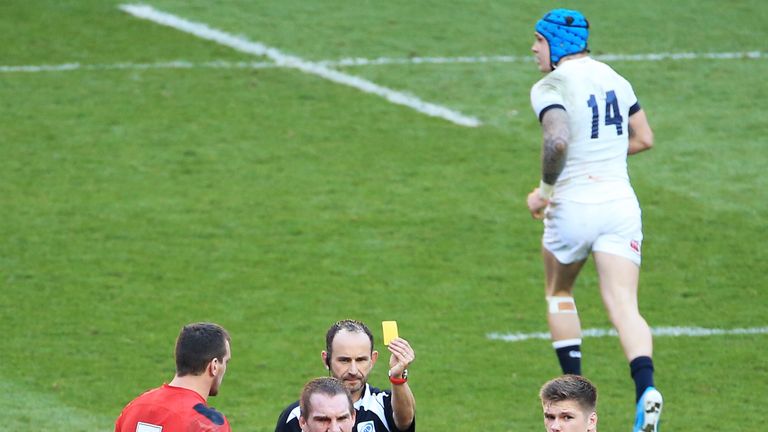
Romain Poite is considered one of the best referees when it comes to the scrum and Stuart Lancaster hopes he will not be swayed by the comments from former coaches and referees about Joe Marler's binding.
England won four scrum penalties against Wales last weekend but Jonathan Kaplan and Bob Dwyer have questioned the legality of England's scrummaging, with the former tweeting: "I'd like to see if the England pack is square on the loosehead side... just the once."
Poite is a referee who rewards the dominant scrum, the British and Irish Lions' series-clinching win over Australia a prime example when he sent Ben Alexander to the bin after just 24 minutes for a series of scrum offences.
England bullied Australia at the set piece during their victory at Twickenham last November, but the Wallabies scrum looked much improved during their successful Rugby Championship campaign following the hiring of former Argentina hooker Mario Ledesma as coach.
However, England are more aggressive than the southern hemisphere nations in this area and if they can draw penalties from the Wallabies, it provides Owen Farrell with the chance to kick for poles or play for territory.
"I know they think we're weak in the forwards, it's pretty obvious - they are saying it out loud," said Michael Cheika.
"And they've stuffed it to us the last couple of times at Twickenham. There's nothing we can say in this room that will make any difference. The only place it will be different is on the field on Saturday.
"I believe in my players 201 per cent. That stuff is not even resonating in my mind."
Visiting props to Twickenham have not had an easy ride under Poite's stewardship in the past though.
Gethin Jenkins fell foul of the French official during the 2014 Six Nations and was sin-binned early in the second half. He told the coaching staff to replace him as he had been 'singled out' and Wales wrote to both Poite and the IRB to ask for clarification.
Sky Sports pundit Stuart Barnes says believes the scrum will be the major point on which the result of the game is decided.
"I think if England can out-scrummage them, they can play the territory and play where they want to play," he said.
"If Australia withstand the scrum, they will win. If they don't, I can see England nicking it. It is going to be thrilling either way."
Job on the line
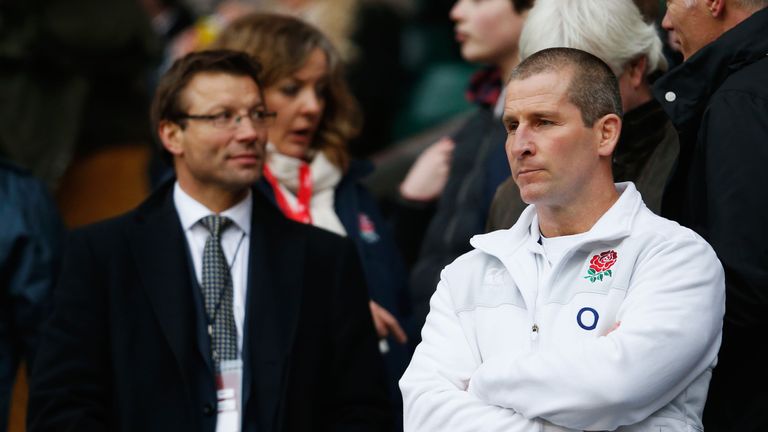
This game may be England's biggest since the 2007 World Cup final, but this is Stuart Lancaster's biggest game ever as coach.
The England boss' future in charge will be under serious threat if his side become the first ever host nation to fail to make it out of the group stages.
Asked if his time with England rested on the result of Saturday's game, Lancaster was in agreement.
"I think that's fair to say," said Lancaster. "It's a must-win game because if we lose we don't get out of the group.
"So there's no point hiding where the accountability lies. As a head coach you don't take the players beyond Saturday, you take them to Saturday.
"You put them in the right place to play a strong game on Saturday. There's no denying it, the stakes are huge for us, but the boys will be ready.
"I'm not going beyond this game, there's a lot of things to play out over the next two weeks.
"You can't spend your time thinking about what's happened in the past or what might happen in the future.
"If you distract yourself with the what-ifs then you aren't doing your job.
Folau v Brown
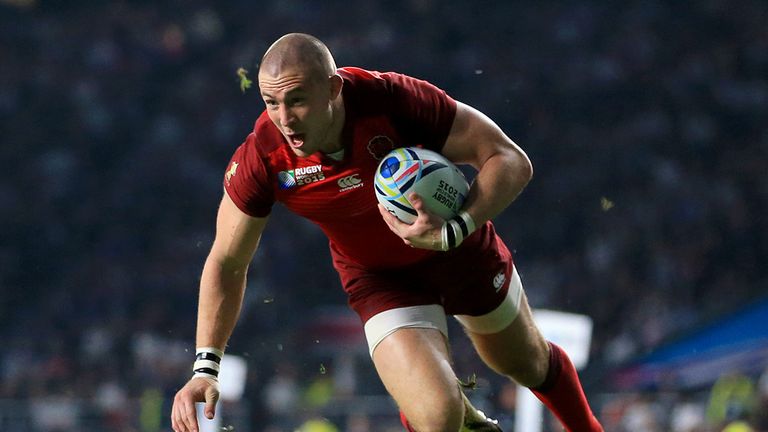
Israel Folau and Mike Brown are two of world rugby's best full-backs; both are solid under the high ball and difficult to contain on the counter-attack.
With England likely to employ a kicking game, Folau will be tested all evening under the Twickenham spotlights, but the Waratahs man won't be bothered by the bombardment.
The league convert becme the first person in Wallabies history to win the John Eales Medal - for Australian player of the year - in two successive years, and only the third to win it twice.
Brown on the other hand has been an instrumental figure for England, scoring tries and hitting the line at speed to keep defences on their toes. His work rate and ability under the high ball are exemplary.
Key to England's success will be the kick chase and the speed at which the line comes up to cover the counter-attack.
Mike Brown will be required to chase the ball and compete for it all evening, while also being the last line of defence when the Wallabies run at England.
While plenty of talk ahead of this game surrounds the fortunes of the fly-halves, the fetchers and the fatties up front, the performances of each full-back will be crucial in who comes away with the Twickenham win.

England: 15 Mike Brown, 14 Anthony Watson, 13 Jonathan Joseph, 12 Brad Barritt, 11 Jonny May, 10 Owen Farrell, 9 Ben Youngs; 1 Joe Marler, 2 Tom Youngs, 3 Dan Cole, 4 Joe Launchbury, 5 Geoff Parling, 6 Tom Wood, 7 Chris Robshaw (c), 8 Ben Morgan.
Replacements: 16 Rob Webber, 17 Mako Vunipola, 18 Kieran Brookes, 19 George Kruis, 20 Nick Easter, 21 Richard Wigglesworth, 22 George Ford, 23 Sam Burgess.
Australia: 15 Israel Folau, 14 Adam Ashley-Cooper, 13 Tevita Kuridrani, 12 Matt Giteau, 11 Rob Horne, 10 Bernard Foley, 9 Will Genia; 1 Scott Sio, 2 Stephen Moore (c), 3 Sekope Kepu, 4 Kane Douglas, 5 Rob Simmons, 6 Scott Fardy, 7 Michael Hooper, 8 David Pocock.
Replacements: 16 Tatafu Polota-Nau, 17 James Slipper, 18 Greg Holmes, 19 Dean Mumm, 20 Ben McCalman, 21 Nick Phipps, 22 Matt Toomua, 23 Kurtley Beale.

